
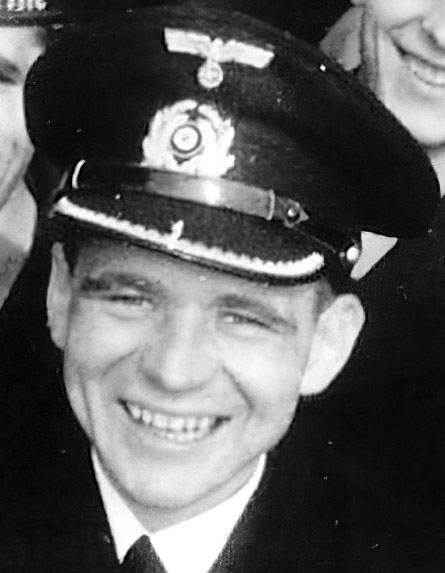
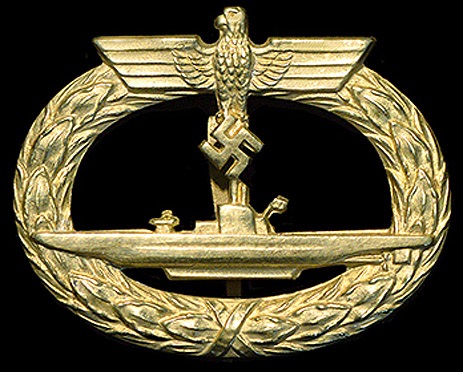
Interview with Werner Herrmann, member of U-boat branch and crew of U-96 and was a consultant for the film Das Boot. Kaiserslautern, 1988.
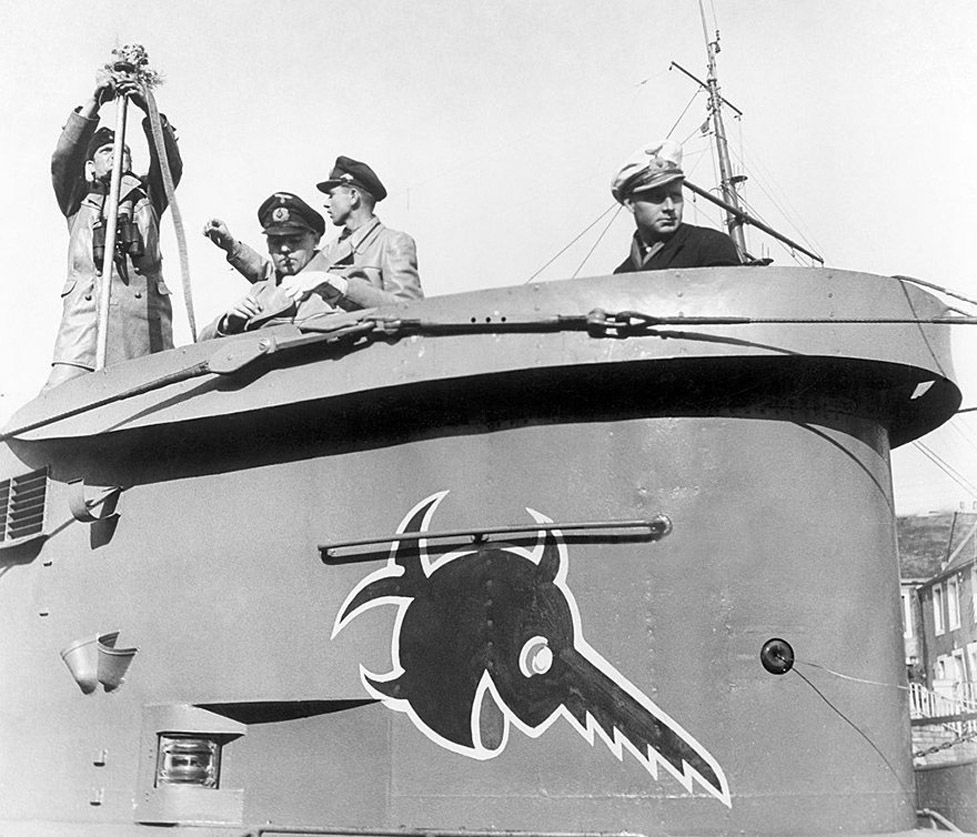
[Above: The extraordinary U-96. Notice the sawfish mascot painted on the boat. On the far right is Kapitänleutnant Lehmann Willenbrock.]
Thanks for agreeing to let me ask you some questions Herr Herrmann. I understand you were in the U-boat service during the war. Can I ask what attracted you to join the U-boat branch?
Herrmann: Yes, Ernst tells me you are a good salty dog, but a young one I see. As I look back, young man, that is not so easy to answer now. When I was young like you and full of zest I wanted to be daring. Like many young Germans I was filled with the notion of daring Nordic warriors fighting a war under the sea.
We would read about the exploits of men like [Lothar von Arnauld] de la Perière, [Walther] Schwieger, and [Reinhold] Saltzwedel. It filled me with excitement to think about being on board a boat and sinking enemy shipping. That stuck with me and never left as I was growing up. However Germany had no real navy after the first war, so it was only a dream.
When Hitler and his regime came to power that changed. You see he reached out to England and made a treaty with them that allowed Germany to start building a navy again. Going through the last years of school I knew my calling was there.
In 1938 I completed all my obligations and applied to become an officer aspirant, meaning I would like to train to become a naval officer some day. I passed the testing and was accepted. This set me on my course.
Before I could serve on board a U-boat I had to go through basic training courses and then was posted to a line ship, the Schleswig-Holstein, which helped to put all the sea training of the last year together into practical applications. This was how the early crews were trained.
Were you on board the ship when Poland was attacked? Can you describe what you knew about it and what happened?
Herrmann: Yes I was on board when we opened fire on Westerplatte. Little has been written about all this. The ship was slated to visit Danzig in August of 1939. We had no idea what our future held then. We were briefed that Poland had illegally built defenses on Westerplatte and had reinforced the area with artillery and forts.
I remember it was very early in the morning when we received orders to open fire on their defenses. It came as a faint surprise to me. The media reports of tensions with Poland had been rising in the past few months. To understand this you must understand the history of the time.
If you don't know I will tell you. Poland was protected by both Germany and Russia and during the first war was solely under German protection. After the war Poland was given much German land, including the citizens. They were just expected to bow to the new rulers.
Some accepted it and others did not. Because there were tensions the Poles attacked parts of Germany from 1919-1922 and so on. This caused uneasiness for years after and resulted in border clashes and fights. The situation remained this way until 1939. We always thought there would be some resolution either peaceful or military.
Something happened in 1939 where thousands of Germans started fleeing Poland and told terrible stories of attacks and confiscation of their property. I know Hitler had sought to reunite Prussia with the Reich and was talking to Poland about how this could be done. The English interfered however and made peace not possible.
Due to the attacks on the German population and provocations the situation was decided by military force. Our weapons opened fire and helped ground forces seize Westerplatte. They had a hard time of it because the Poles had built heavy forts on the land which made taking them hard.
The strength of their defenses was underestimated and this became a longer battle than what was first thought. We succeeded in breaking them and they surrendered. I was able to go ashore after it was over to see the effects of our fire. We were amazed at the works the Poles had built up under the noses of the supposed neutral observers.
After the start of the war I was able to start attending training courses which you might like to know took a long time. I was in training most all of 1940 which put me on board torpedo boats to learn operations and maneuvers. There was always a course of some skill that needed to be done.
How did you feel when Germany went to war?
Herrmann: It was not a good feeling my friend. It is hard to explain to you. The post-war generation was raised feeling there was unfinished business; the war had ended unfairly for us. I think many Germans had that nagging feeling that somehow another conflict was inevitable.
All of the post-war fighting, occupation, and reparations made Germans angry and wanted a way to set things right. Hitler told us he was going to do that and that the lost land would be returned and the crushing reparations would be stopped.
In Hitler we placed our trust and he fulfilled every promise he made, all with peace. One by one the lands were being returned to us. Poland was the sole sticking point, all because the English decided to stop this path. Maybe someday there will be more truthful information told about this.
While I was sad that we had war again, I think for many Germans this was expected and a chance for redemption. It got out of control you see, I don't think Hitler ever wanted it to get as big as it did. Things happened I can not explain but it was as if the world was rallied against Germany when it did not have to be.
What we thought would be a small local war to achieve a small final goal ended up becoming the largest war in history.
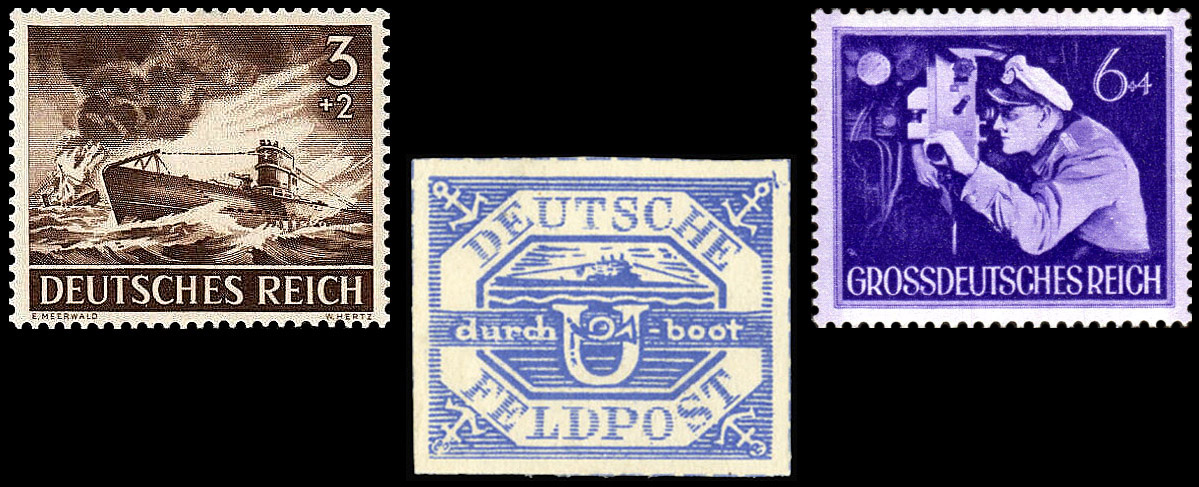
[Above: Postage stamps honoring the U-boat branch in the Third Reich. On the far left: this shows a surfaced U-boat (type VII A) with an Allied boat burning in the distance (released March 21, 1943). On the far right: this shows a U-boat commander on a periscope (released March 11, 1944). And lastly, the lower stamp, and many times rarer than the others, was printed in the closing days of WWII, in March 1945. This was an emergency issue for the German troops (31st Infantry Division) cut off on the heavily fortified Hela peninsula (Danzig). This stamp was intended for postal transport via a U-boat, anticipating ships not being able to reach the soldiers, but was never used as intended due to the fact that regular ships could still reach the peninsula afterall. There are very rare examples of the stamp being used for surface mail, but it was very rare and I'm unsure what the circumstance of its usage were.]
When you made it to the U-boat arm what did you like/dislike about the U-boats?
Herrmann: Well I will tell you the life of a U-boat man was very good while on land. We had earned the respect of all the branches. Wearing that U-boat badge was a very proud sign of being an old salty dog. Wherever we went, people bought drinks and the girls flirted.
We had very good quarters and amenities. Karl Dönitz was a former U-boat man from the first war, so he was one of us and made sure we were treated like kings. Most anything that could help take our minds off the war was employed on our bases.
We could go on vacations, tours, shopping sprees, and spas as often as we wanted to. We had transportation made available to us so life was good for sure.
Now being on board a U-boat during wartime was not a pleasure cruise. It was cramped, damp, noisy, and smelly. You literally had to crawl into another man's stink when your shift was over. If we were lucky there would be 2 heads for 50 men, but usually one was full of provisions.
For sure it was not a pleasant duty, but to feel the sea on a nice warm day was all worth it at times. In bad weather, that was a different story. We had to hunt for convoys with binoculars and sound equipment. It was sometimes like trying to find a needle in a haystack. If we were ever seen, then the fireworks started and that was quite unpleasant.
You helped consult for the movie Das Boot, which I saw when it first came out. How close did the movie come to portraying the life of a U-boat crew?
Herrmann: Oh it is very close. You see the producers sought out former veterans and got their input. They were quite good to us, and let me tell you something. They have my respect till I die. You see when Günther's book came out and the idea of a movie came up, your Americans came from Hollywood.
They wanted to help produce the film with the catch they wanted to rewrite the scripts to show us as the cruel hunters of Allied propaganda. We were furious but thought the producers would cave in. They would not. They defended us and argued the U-boat war was free of any crimes on our side.
I say the only war crimes were committed by the British and Americans which maybe someday will get more attention. They sent the Americans packing and were able to get funding to make this a purely German film. Truthfully telling what it was like to be on board U-96 during the war.
They had to take liberties with some aspects, like the old dog insulting Hitler and the final sinking scene, which U-96 was not sunk that way. But everything else was spot on; some was even taken from real life. We had a young boy who did get a French girl pregnant.
I remember this, he was so afraid she would be targeted by the resistance who had killed a girl in another city who became pregnant. We assured him steps were taken to protect the citizens from terrorists. The other was a crew member had a sick wife, and desperately waited to hear from her about treatments she was getting.
The attacks were real as well, we gave much detail on this and they got it right. Aside from those small details I mentioned the movie was a great success and did a lot for us U-boat men here. It showed we did our duty and remained faithful.
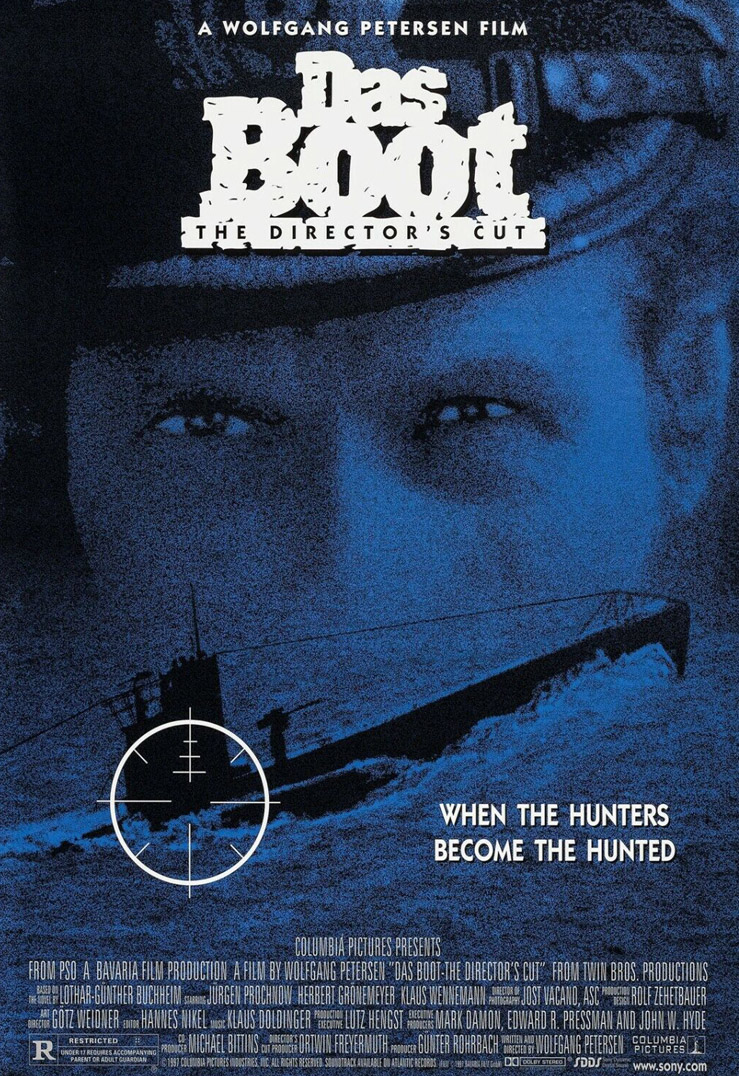
[Above: Poster for the 1981 German film Das Boot (The Boat).]
Do you think Germany could have won the war with U-boats if anything was done different?
Herrmann: The U-boat was a very effective weapon for its time. Even Churchill said that we scared him more than any other weapon. If you do not know, Germany went into the war with very few boats; alas the whole navy was very small compared to who we were fighting.
There was great success in the beginning, so could you imagine, if say, we fielded 500 boats instead of just a handful. Britain's lifeline would have not only been cut, but destroyed. We had too few boats to really do any damage to them in the beginning, and by the time more boats came online they came up with countermeasures.
The war could have possibly been won if only we had more boats in the beginning. Germany was not on a war building plan so that is why we did not have what we should have had. It cost us in the long run. It surprised me it took the Allies so long to enact convoys.
In the first war they did this and it was very effective, when war broke out again it took them months to get this put in place, and U-boats reaped a great harvest. If only we had more boats the seas would have been swept faster than they could build.
You mentioned war crimes; do you feel Germans are unjustly accused of being called war criminals?
Herrmann: I am only speaking of the war at sea, not anywhere else. Other crimes I am not qualified to address. The war at sea was fought relatively clean by all with some exceptions. The Laconia tragedy [September 12, 1942] is one where American bombers attacked Hartenstein's boat after he surfaced to pick up civilian survivors.
He radioed in the open to ask for help but was attacked and driven off. There were reports of German crews being shot at in the water, or just left to drown. Hospital ships were attacked by Allied planes and so on. We had very strict orders to obey all rules of war and to never break them.
In the early times we would surface to aid any survivors of a ship if we could, some boats even towed life boats if it was safe to do so. We would have special packs made to give to survivors to help them get rescued and have food stuff. The stories the Allies told during and after the war portraying us as shooting survivors and so forth are false.
What good would it do us to commit these acts? It would be hard on the men for starters and would make no military sense. This is why the producers said no to your Hollywood, they wouldn't partake in the lies. As I said my hats off to them for sticking up for our honor.
I understand you were given command of a U-boat, so you were a U-boat commander?
Herrmann: Yes, towards the end I was. I was given command of a new type of boat, U-2510 which was called the electric boat ['Elektroboot']. It was a new super weapon that if only we would have had these earlier and in bigger numbers would have turned the tide for us.
They were hard to detect, could stay submerged and carried a larger payload. These were the boats the Allies studied after the war and anyone associated with them became a celebrity to the Allies. My boat was kept in sea trials and training for the duration of the war and we never went out on a patrol. One that did on the last day of the war snuck up to a battle group and would have had great success. These boats were too little too late.
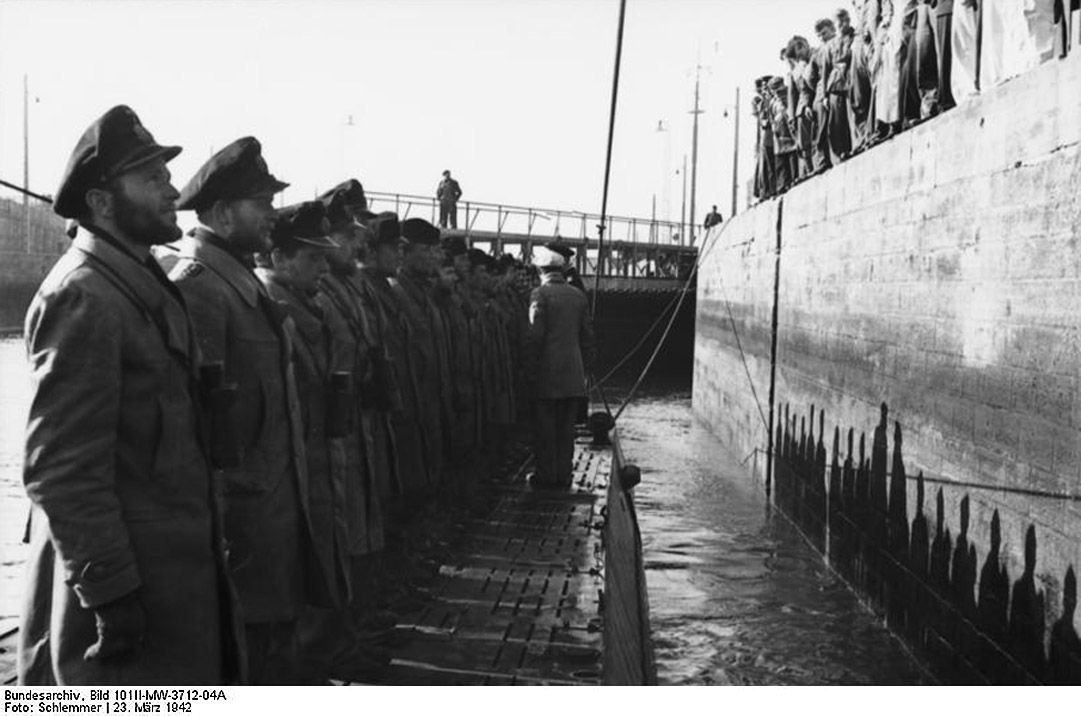
[Above: U-96 entering St. Nazaire (Brittany), crew on deck, March 23, 1942. Kapitänleutnant Lehmann Willenbrock is the first person on the far left.]]
How did the average U-boat view Hitler? In Das Boot he was made fun of.
Herrmann: Oh boy, well that is hard to say in the type of world we are in today I am afraid. He was our leader and he was greatly respected as our leader. Many of us had no love of politics, we were sailors serving our country. We had some men who were party members and others who opposed the party. It was a mixed bag of men, but nowhere would you have disrespect for the Führer. That would be like someone in the Royal Navy belittling Churchill or the King. It would have brought discord and possibly investigation.
It was the same in the Kriegsmarine, if you said anything bad about Hitler you might have got called in to account for it. There was the frustration that all military men feel when things don't go right, and blame is cast on all. I know the thing today is to blame Hitler for all the failures and the war, but I feel the truth is different.
The movie had to add the Hitler reference to go along with the times, and it could have been plausible as some did wonder why he didn't put more into our branch. Some may have felt he left us out because he was not a naval leader. However I understand there was so much more to leading the nation in time of war.
It takes 2 sides to start a war and there are 2 sides of every viewpoint. So I have nothing bad to say about him and I hope that will be understood or forgiven.
My last question is how was it in occupied France? Did the people treat you well?
Herrmann: Yes, it was fine and they treated us very well. When you read otherwise you must remember propagandists take one small incident and blow it way out of proportion, that is what they do. We were under very strict orders to behave ourselves and for the most part our men did.
Sure there would be times they drank too much, got into fights, or made unwanted advances on women. This happens in every nation's military and was not just a German thing. The French suffered terribly due to Allied bombings, and there were times we helped them.
Once, in western France a town was bombed, and then re-bombed again. We were pulled in to help the survivors and I saw Russian prisoners of war who had been killed. They were being used to help find survivors and remove rubble. They had been caught in the city and many were killed seeking shelter in the cellars. We helped the French pull them out.
There was a camp nearby and from what I could tell they were very well cared for. Some of the Russians were even allowed to walk back to camp by themselves to fetch food for comrades. We were surprised to see this, and even more so when more arrived with German guards who had no weapons.
They all chipped in to remove some timber that covered a cellar. We pulled a family out of that cellar and it felt very good to do. It was a badly wounded husband and his young wife and children. The terrified look on the wife's face turned to relief and thankfulness for us.
Germany also had many foreigners who came to help in the factories and with other tasks; we would often see Spanish, Swedes, Poles, and others who would be working as translators, drivers, and workers in those times. They did not look like us, meaning they were not of Nordic ancestry, but we did not care.
They came to help out and we respected them all. I never saw any of this racial talk they bring up today. We knew who we were and what group we belonged to but we had great respect for anyone who helped us. This included the French for sure; we meant no harm to them.
The French may not have wanted us there as conquerors but they did respect us and they saw how we treated them. We did not talk down to them or treat them as defeated foes. In contrast, I can tell you many of the younger boys who were without females quickly found French girls to be ready and willing to accept them as a companion.
For the older men, there were places they could go for immediate comfort with women who had a chosen profession and were deemed clean by health offices. I must tell you though very few Germans used these women. For sure some did, but many remained faithful to their wives and fiancées.
I will add that many Germans made lifelong friends or partners with the French to this day, in spite of the war.
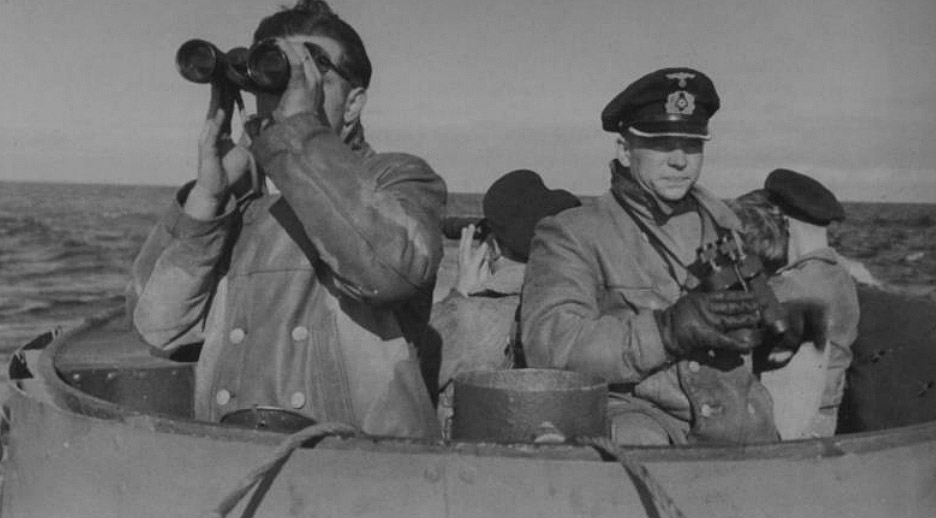
[Above: Lieutenant Werner Herrmann (right) and boatswain Ernst
Wittmann.]
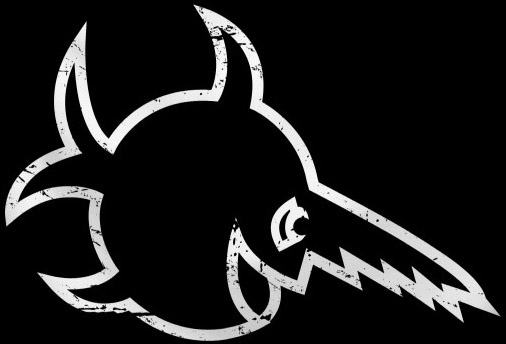
[Above: Sawfish logo of U-96.]
Back to Interviews










